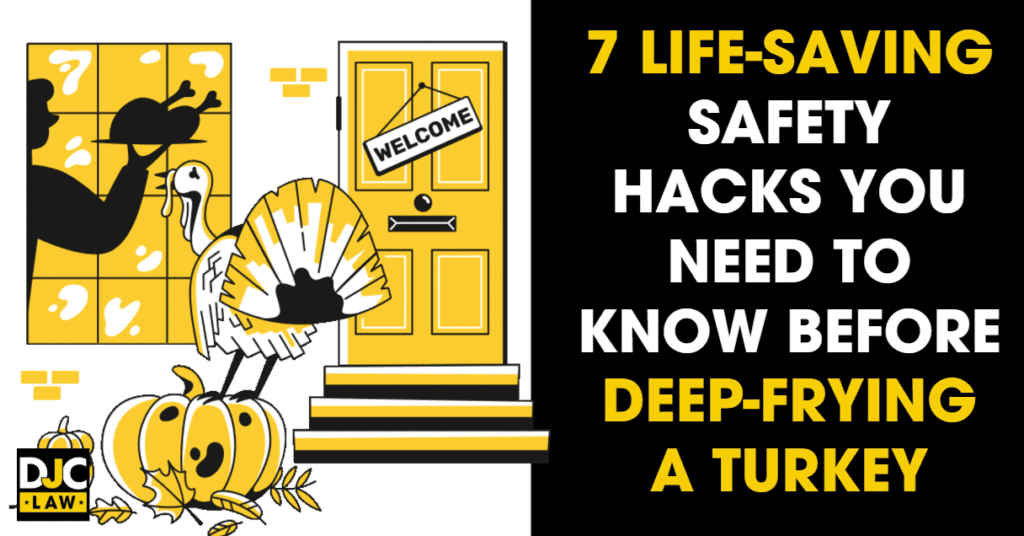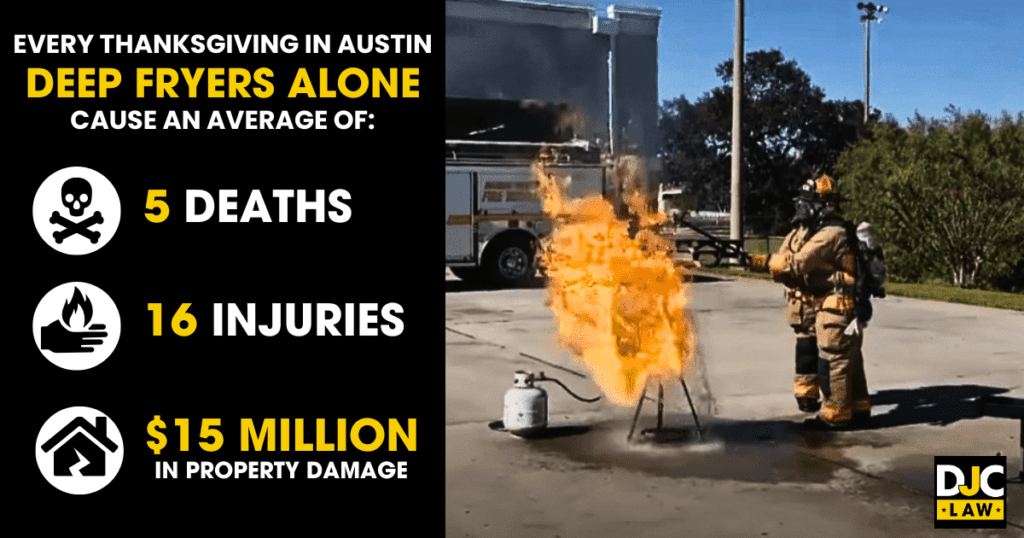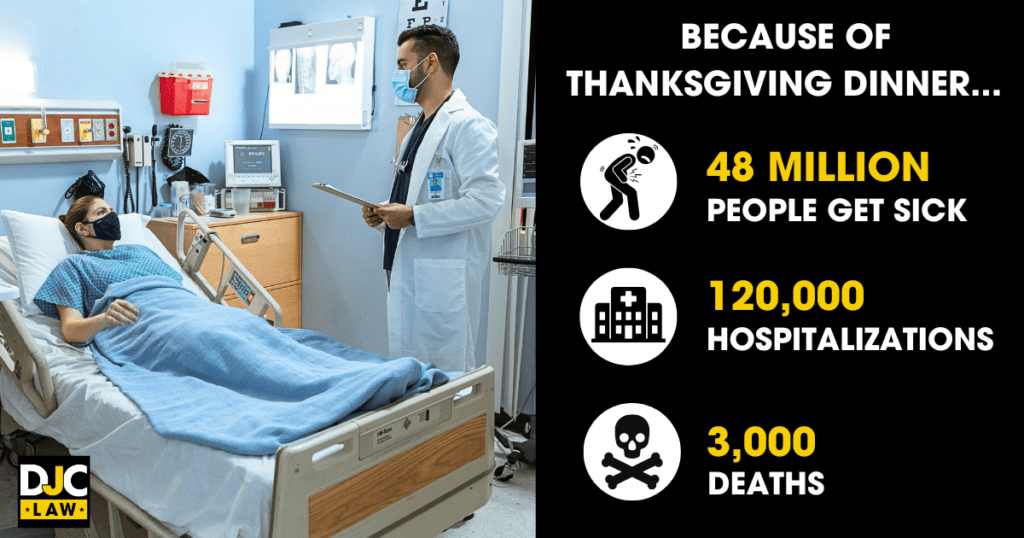
Thanksgiving is the time of year to enjoy delicious food with loved ones. Yet the last thing you want to think about is a fire. The Pew Research Center states that 91% of Americans celebrate Thanksgiving, which gives tens of millions of us ample opportunity to show off our culinary skills.
Yet the Government of Austin, Texas, reveals that deep fryers alone result in an average of five deaths, 16 injuries, and more than $15 million in property damage every Thanksgiving.

If you or a loved one is injured due to a fire or accident, consulting an Austin personal injury lawyer can help you understand your rights and seek compensation for damages.
In this holiday guide, we provide vital information on what you can do to stay safe as you deep fry your big bird this Thanksgiving season.
Key Takeaways
-
Deep-frying a turkey is extremely dangerous and results in countless home cooking fires and serious injuries every year.
-
Never attempt to deep-fry a turkey. Follow USDA guidelines for thawing your turkey entirely by either using refrigeration or submerging it in cold water.
-
Follow the appropriate safety guidelines, including finding a flat, open space outside without flammable materials, wearing safety gear, and keeping children and pets away from the scene.
-
Keep a fire extinguisher nearby with a wet chemical mix in case the worst happens. Water cannot be used to put out an oil fire, and it will only make the situation worse.
-
Your ordinary homeowners’ insurance policy may protect you against liability if you weren’t negligent in deep-frying your turkey and if you followed the manufacturer’s instructions.
-
If you were the victim of a deep-fryer accident on Thanksgiving, you may have the right to claim compensation. Contact a personal injury lawyer to assess your case and push your right to a fair settlement.
7 Top Deep Fry Turkey Safety Tips for Thanksgiving 2024
Cooking has been the bane of many Thanksgivings. According to the U.S. Fire Administration, 74% of all residential fires are caused by cooking. This should tell you all you need to know about educating yourself before introducing your turkey to your new state-of-the-art deep fryer.
Here are our top seven safety tips for enjoying a safe Thanksgiving get-together in 2024.
1. Never Attempt to Deep-Fry a Frozen Turkey

Never attempt to deep-fry a frozen turkey. The frozen moisture will melt and combine with hot oil, pouring the boiling mixture onto your setup. Moreover, deep-frying a frozen or insufficiently thawed turkey increases the risk of food poisoning because it becomes nearly impossible to tell whether the turkey has been cooked through.
According to Today.com, 48 million people get sick because of Thanksgiving dinner, with 120,000 hospitalizations and 3,000 deaths. That’s why if you’re thinking about thawing on Thanksgiving day, you’re already too late.
Some of the “quick” methods people recommend are the fastest way to make your guests sick, including thawing by:
-
Hot water
-
Microwave
-
Room temperature
The best way to thaw your turkey is to place it in the refrigerator or cold water a few days before the big day. Note that if you’re using cold water, you must completely change the cold water anytime it gets above 40 F.
Here’s the USDA guide to thawing times by weight in the refrigerator:
-
< 12 lbs – 1-3 days
-
12-16 lbs – 3-4 days
-
16-20 lbs – 4-5 days
-
20-24 lbs – 5-6 days
If you’re using the cold water method, which is recommended as a last resort, here are USDA’s recommended times:
-
< 12 lbs – 2-6 hours
-
12-16 lbs – 6-8 hours
-
16-20 lbs – 8-10 hours
-
20-24 lbs – 10-12 hours
2. Go Slow
When it’s time to launch the cooking process and fry your turkey, the key is to go slow. Lower your turkey too quickly, and the oil could bubble over, causing serious burns and house fires. The key is slowly submerging the turkey a few inches at a time, watching the level in the deep fryer as you go.
Always use a hanger to lower your bird into the oil by a few inches each time. Check that the oil doesn’t start splattering. Pull the turkey up and allow the bubbling to calm down before lowering it again if it does begin splattering. It may take a few tries to safely get the bird into the deep fryer.
Once fully submerged, cooking time is generally around 3.5 minutes per pound. For example, a 20-pound turkey takes just over an hour to cook.
3. Carefully Watch the Oil Temperature
Use a thermometer to check the oil temperature. The oil temperature naturally drops when you add the turkey to the deep-fryer because the bird will absorb some of the heat. Moreover, if the oil gets too hot, you increase the risk of an oil spill and get a dry turkey. If the oil is too cold, the meat will become excessively greasy.
The best way to handle the temperature issue is to start at a lower temperature, such as 250 F. Once you’ve lowered the turkey into the deep-fryer, crank the heat back up to 325-350 F, depending on the temperature. Note that if the oil doesn’t seem to get hot enough, you may need a bigger burner.
Bonus Tip: Watch the Oil Level
Filling your turkey fryer to the brim with oil may be tempting to ensure you’re submerging the entire bird, but a solid will displace the liquids around it. If the level is too high, oil spills are guaranteed, potentially causing a turkey fryer fire.
Try a test run with water so that you’re sure how much the oil level will rise when you dump the bird in. Note where the water line is and then fill the oil up to no higher than this line, or preferably slightly lower.
4. Wear Protective Cooking Gear
Always wear protective cooking gear when deep-frying a turkey. Wear thick gloving, an apron, and oven mitts. It’s also recommended to wear safety goggles in case the oil starts spitting at you, as the oil could blind you permanently.
According to the U.S. Centers for Disease Control (CDC), 1.4 million people are burned every year, with as many as 108,000 resulting in hospitalization. Oil burns are among the most serious, causing severe injuries, with some even burning all the way down to the bone, resulting in permanent disfigurement.
Above all, while deep frying, you should never leave your deep-fryer unattended. An active fryer is perhaps the most dangerous implement on your property.
5. Keep Children & Pets Away
Children and pets are a regular fixture at Thanksgiving dinners, but they’re at serious risk of injury in proximity to a deep-fryer. Make the area around your deep fryer an adult-only zone. Set clear rules for your guests before you begin cooking, and ensure that parents and guardians enforce them.
It may be cool to watch the flames spurt as the centerpiece of your Thanksgiving dinner comes to life, but the more people around the pot, the greater the chance of injury. In an ideal world, you’d only allow a small number of people around, and they should all be wearing the right kind of clothing and some safety equipment.
If you have to leave your fryer, designate a spotter to avoid curious children and animals from getting too close.
6. Keep Outdoor Fryers a Safe Distance
Deep-frying a turkey should only happen in an open, non-flammable space, meaning outside. Ensure that you’re frying outside and away from your house. The area you choose should be non-flammable, meaning there shouldn’t be any trees, foliage, or wood piles within spitting distance.
On a side note, “away from the house” doesn’t mean inside your garage, on the patio, or in your shed with the windows open. Remember, there’s an average of three gallons of boiling oil in these pots. Flammable materials are basically a recipe for a serious grease fire.
But what should you do if you live in an apartment or a condo complex?
Ideally, you should choose another method of cooking your turkey or find another place to hold your feast. It’s simply too dangerous, and your risk of being sued because you accidentally set the complex on fire is far too high.
Bonus Tip: Measure the Ground
The ground you place your frying station on should be completely level. Even a minor slope can result in serious injuries if something goes wrong. Remember, your bird is heavy, and the impact of lowering it into the oil could cause the entire station to topple over without stable ground.
Remember, if it topples over, you won’t be able to salvage the situation. The only way to put out grease fires is with a fire extinguisher and an urgent call to your local fire department. If you’ve got a propane tank, you also risk an explosion.
7. Have a Fire Extinguisher Nearby
Fires happen, meaning you must always have a fire extinguisher at the ready and ensure you know how to use it. Cooking oil fires are among the most dangerous because they cannot be put out by conventional means, which is why it’s always recommended to deep fry your turkey outside and far away from anything flammable.
The problem with these fires is that they can’t be put out by water because water doesn’t mix with oil. In fact, adding water only makes the fire worse, as it is also fuelled by highly flammable materials, like the remains of the oil.
Plus, these fires burn at extremely high temperatures, re-ignite exceptionally quickly, and can spread faster than you think. That’s why only a fire extinguisher with a wet chemical mix will suffice for putting out these fires.
Deep Frying Insurance and Liability
Deep frying insurance is a type of insurance policy aimed at businesses. Most restaurants with a deep fryer may have a separate policy or have it bundled into their usual business insurance to cover against all risks presented by turkey fryers, including injury, food poisoning, and machinery breakdowns.
These policies may also cover various forms of damage, including:
-
Public liability
-
Product liability
-
Property damage
-
Theft
-
Deep fryer breakdowns
Do you need deep frying insurance if you’re an average Joe enjoying Thanksgiving at home with family and friends? Not necessarily. These policies are generally designed for businesses that deep fry regularly as part of their usual day-to-day functions.
Does Homeowner’s Insurance Cover Deep Frying Accidents?
Homeowner’s insurance may cover deep frying accidents. The caveat is that you must have followed the manufacturer’s instructions for using the deep fryer and prove that you weren’t negligent in your actions.
On the point of negligence, this is a matter of opinion. Generally, if you were using your deep fryer indoors to fry a turkey, this would be considered negligent, and your insurance provider may deny your claim.
So, what does a homeowners’ insurance cover?
It may cover damage to your home and other personal property, alongside any personal liability that arises from the accident. If you’ve got the personal umbrella policy, you’ll also have coverage that covers non-excluded liability events that would ordinarily exceed the total value of your homeowners’ insurance policy.
Of course, if you were negligent and didn’t follow the manufacturer’s instructions, you could be left paying out expenses ranging from:
-
Medical bills
-
Lost wages
-
Property damage
-
Wrongful death
-
Legal fees
And these expenses are no joke. Serious deep fryer accidents could amount to six and seven-figure sums, which are far beyond the reach of your average homeowner.
How Frying Accidents Can Lead to Liability Lawsuits
Property owners could be held liable for accidents when deep frying turkeys in some circumstances. You could be held liable for any injuries that occur on your property if you don’t take reasonable steps to protect your guests and neighbors.
For example, you must inspect the area for dangers, state the hazards of deep-frying a turkey, and provide clear warnings at every turn. Neglect to do this, and the injured party could file a personal injury lawsuit against you.
Proving deep frying personal injury claims requires proving several key elements:
-
The at-fault party is either the owner or the legal occupant of the property.
-
The accident victim must have been legally on the property at the time, such as being an invited guest.
-
The at-fault party failed to exercise reasonable care.
-
The accident victim suffered losses as a result of the at-fault party’s negligence, such as a physical injury.
Of course, any accident doesn’t necessarily mean you’ll be held liable for a deep-fried turkey debacle on your property. For example, if you clearly outlined the dangers, provided warnings, and took every precautionary step, and a guest ignored you and led to the frying station falling over, the blame may fall on them for failing to take heed.
How a Personal Injury Lawyer Can Help After a Turkey Frying Accident
The National Fire Protection Association reveals that Thanksgiving leads to more fires than any other day in November. If you were the victim of an accident that wasn’t your fault at a Thanksgiving gathering, enlisting a personal injury attorney enables you to win a settlement for your losses.
Here’s how a personal injury lawyer can help:
-
Assessing the value of your claim.
-
Gathering evidence to prove your injuries.
-
Working with experts to prove the extent of your losses and demonstrate fault.
-
Filing personal injury claims before the two-year statute of limitations elapses.
-
Providing help and guidance along the way.
-
Negotiating with insurers and legal teams.
-
Taking your case to court.
Hiring a personal injury attorney is the best way to win a fair settlement and get the justice you deserve as you recover from your injuries. Remember, if you don’t win your case, you don’t pay a cent in legal costs.
Deep-Fried Turkey Safety FAQs
How long can a deep-fried turkey stay out?
Avoid food poisoning by ensuring you never leave your turkey out for more than two hours at room temperature. Slice up any leftover turkey and store it in a refrigerator. If storing for longer than three or four days, place the leftovers in the freezer.
What can go wrong with deep frying a turkey?
A small amount of hot oil that comes into contact with your burner can cause it to catch fire. Overfilling your cooking pot or lowering in an unthawed turkey can cause hot cooking oil to spill, resulting in catastrophic burns.
How long can you keep cooking oil after deep frying a turkey?
The leftover oil, once properly cooled, may be kept in your refrigerator for several months. Cover the oil and leave it in the refrigerator to stop it from getting rancid. Most cooking oil can be reused eight to ten times before it shows signs of deterioration. Of course, your choice of oil matters. Corn oil isn’t the same as peanut or canola oil.



